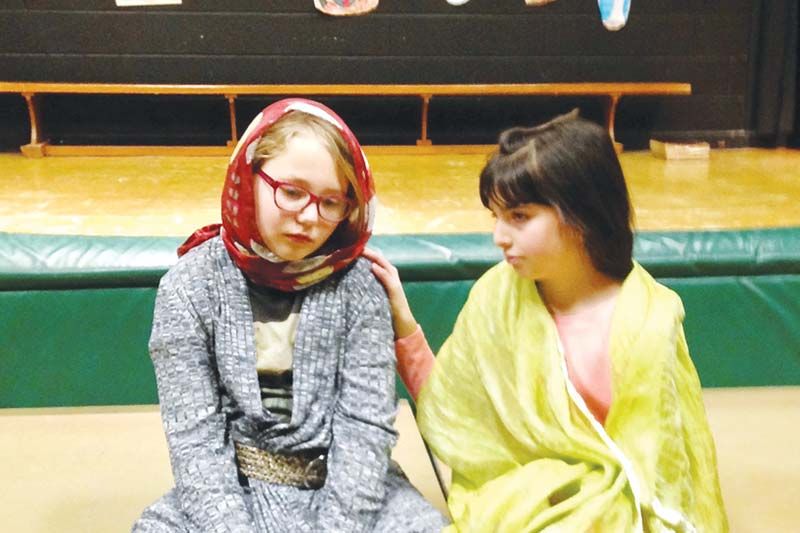Wilma Kenny | Mar 28, 2018
Warning to teens with younger siblings: you are being watched. Closely.
Last week, a class of grades 4/5 students at Elginburg Public School performed a comedy they had written themselves, based on observations of teenagers they know. The cast of characters gives a hint: Muscles, Pizza Eater, Fashionista, Smarty, Bubbly, Cool Kid, Brainy, Cynic. But there are others, too: Newcomer, Teen on Wheels, Religious (A&B), Shy.
Their goal was to present a play that represented a wide variety of high schoolers, and to demonstrate how some of the stereotypes we all carry can vanish when we get better acquainted with strangers. Class research included inviting a refugee family to come tell of their experiences in escaping from a war zone.
In the play, the teacher (played by a natural comedian), pairs her class off to do a history assignment by insisting they ‘work with someone you don’t know, not one of your friends.’ In the course of trying to more or less work together, the students quickly find out that other people are not always what they seem to be.
A student in a wheelchair challenges a scornful athlete to a basketball shootout, which she wins easily, when the athlete has to also manoeuvre a wheelchair as well as a basketball. A pair of awkward boys begin a tentative friendship; a girl obsessed with fashionable clothing learns to feel compassion for a newcomer’s terrible memories of fleeing to Canada. “We tried to show that when we get to really know somebody who’s different, we can learn to respect each other and each other’s beliefs,” was one comment in the question and answer session that followed the in-school performance.
One of the running jokes about teens was their constant obsession with cellphones and selfies: as a group rediscovers the pleasure of talking together, the Cynic stalks off, muttering that with a cellphone, “you don’t ever have to talk to anyone in person.” However, one of the first questions from the audience was: “Were your cell phones real?” (The answer: a few, but most were calculators or black cardboard).
The class is to be congratulated on their excellent performance: the action moved smoothly and quickly from scene to scene, lines were clearly spoken, they made fast recoveries from the few brief line ‘fluffs’, and, hardest of all, they paused when the audience laughed, which happened frequently.
Teacher/director Jerri Jerreat, an author in her own right, illustrates a very old quote from the Chinese Laozi: “Of a good leader, when his(her) work is done, the people will say, ‘We did this ourselves.’”
More Stories
- Province clarifies stance - Says Private Well Water Testing Will Continue
- Frontenac County Stays Internal for CAO - Appoints Kevin Farrell
- Addington Highlands Tax Bill Going Up 6.93%
- Perth Road United Church Donation to The Grace Centre
- 21 Years Of Dump Life Left At South Frontenac Waste Site
- Eclipse 2024 – Once In A Lifetime
- National Tourism Week
- NeLL Spring Open House and Anniversary Concert
- 25 years at Bishop Lake Outdoor Centre
- Grounds Contracts Down, Custodial Contracts Up In Central Frontenac

